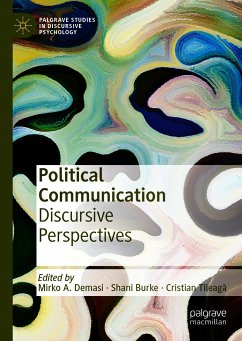Political Communication: Discursive Perspectives highlights the value of contributions from outside English speaking academia and is essential reading for academics, researchers and students interested in political communication or discursive psychology.
Mirko A. Demasi is a lecturer in psychology at York St John University, UK. His current research interest is in the study of political debates on the European Union in the context of Brexit, constructions of truth and factuality as rhetorical and moral concerns, contested political discourse and the study of racist discourse in Finland and beyond.
Shani Burke is a senior lecturer in psychology at Teesside University, UK. Her research interests are applying discursive psychology to Islamophobic and far-right discourse, focusing on how potentially prejudicial arguments are presented as 'reasonable'. Her work has been published in a range of journals, such as Discourse and Society and the Journal of Community and Applied Social Psychology.
Cristian Tileaga is Reader in Social Psychology in the School of Social Sciences and Humanities at Loughborough University, UK. He has written extensively on discursive psychology, prejudice and discrimination, collective memory, and interdisciplinarity. He is the author of a number of books, including Discursive Psychology: Classic and Contemporary Issues (2015, with Elizabeth Stokoe) and The Nature of Prejudice: Society, Discrimination and Moral Exclusion (2016).
Dieser Download kann aus rechtlichen Gründen nur mit Rechnungsadresse in A, B, BG, CY, CZ, D, DK, EW, E, FIN, F, GR, HR, H, IRL, I, LT, L, LR, M, NL, PL, P, R, S, SLO, SK ausgeliefert werden.









